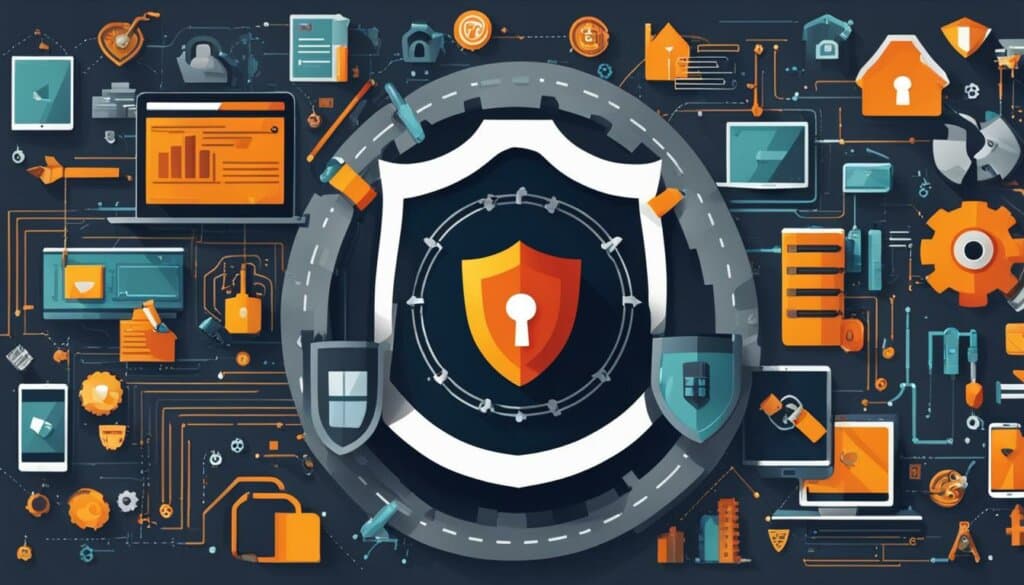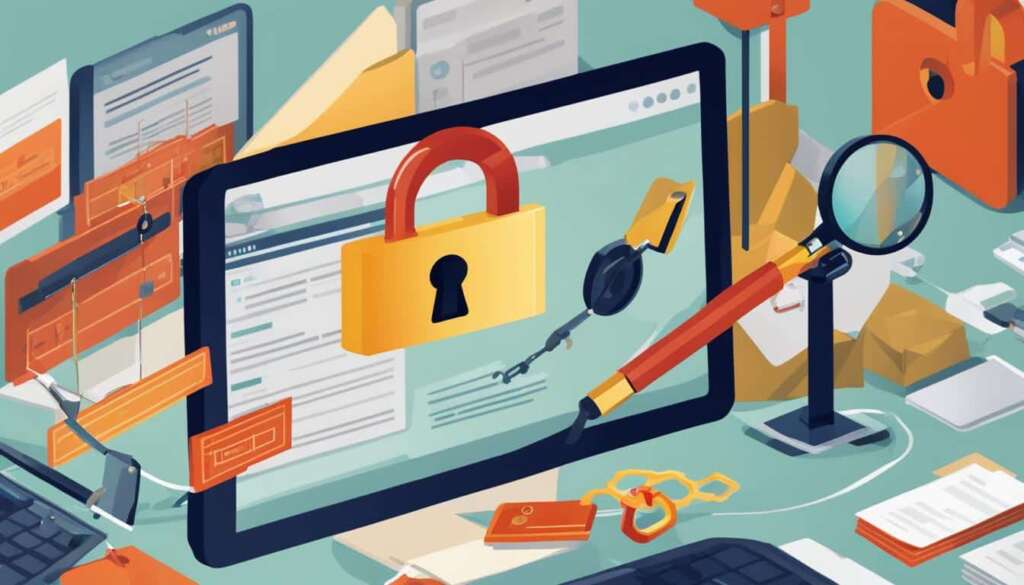Table of Contents
Protecting your small business from cyber threats is crucial in today’s digital landscape. With the increasing frequency and sophistication of cyberattacks, it is essential to implement effective cybersecurity solutions. In this practical guide, we will explore cybersecurity solutions for small businesses, cybersecurity services, and small business cybersecurity.
Studies show that small businesses are increasingly targeted by cyberattacks, with devastating consequences. Approximately 60% of small businesses close down within six months of being hacked. This highlights the urgent need for small businesses to prioritize cybersecurity.
With over 4,000 ransomware attacks and phishing attempts occurring daily, it is crucial to have cost-effective solutions and strategies in place to improve security systems and policies. Our practical guide will provide you with the knowledge and tools you need to enhance your small business’s cybersecurity posture.
Stay tuned for the upcoming sections, where we will cover the importance of cybersecurity for small businesses, assessing cybersecurity risks, protecting your small business, employee training for enhanced security, responding to and recovering from cybersecurity breaches, establishing a culture of security, the role of a Security Program Manager, the role of IT in cybersecurity, and achieving the highest security posture.
By implementing the recommendations in this guide, you can enhance your small business’s security measures, protect your digital assets, and safeguard your customers’ data. Together, let’s minimize the risk of costly and damaging cyber incidents.
The Importance of Cybersecurity for Small Businesses
Cybersecurity plays a crucial role in the success and growth of small businesses. With the increasing number of cyberattacks, it is essential for small businesses to prioritize the protection of their digital assets and customer data. Without adequate cybersecurity measures in place, small businesses face financial, reputational, and strategic risks.
Implementing effective network security solutions and data protection services enables small businesses to safeguard their sensitive information, prevent unauthorized access to systems, and maintain their reputation. Moreover, robust cybersecurity measures are often required for regulatory compliance.
To fully understand the significance of cybersecurity for small businesses, it is important to recognize the potential impacts of cyber incidents. The financial consequences of a data breach can be devastating for small businesses, leading to costly legal fees, loss of customers, and damage to their brand reputation. By investing in digital security solutions, small businesses can minimize these risks and create a secure environment for their operations.
The Role of Cybersecurity in Business
“Effective cybersecurity measures allow small businesses to protect their digital assets, safeguard customer data, and maintain their reputation. Without adequate cybersecurity in place, small businesses face financial, reputational, and strategic risks.”
Cybersecurity is not just a matter of preventing cyberattacks, but also about instilling confidence in customers, partners, and stakeholders. Small businesses that prioritize cybersecurity demonstrate their commitment to protecting sensitive information, which can enhance their reputation and attract more customers. Additionally, a strong cybersecurity posture can open up new business opportunities, as many large organizations require their partners and vendors to have robust data protection measures in place.
In conclusion, the importance of cybersecurity for small businesses cannot be overstated. By implementing network security solutions, data protection services, and digital security measures, small businesses can protect their valuable assets, maintain customer trust, and mitigate the risks associated with cyber incidents. Investing in cybersecurity is a proactive approach that ultimately contributes to the long-term success and resilience of small businesses.
Assessing Cybersecurity Risks
Conducting a thorough assessment of cybersecurity risks is crucial for small businesses to protect their digital assets and prevent cyberattacks. By identifying potential vulnerabilities in systems and networks, small businesses can implement targeted solutions to mitigate those risks.
One aspect of assessing cybersecurity risks is evaluating software protections and countermeasures. This involves examining the security features of the software and ensuring that it is up to date with the latest patches and updates. Additionally, small businesses should consider implementing robust firewalls, intrusion detection systems, and antivirus software to enhance their overall security.
Understanding the common cybersecurity threats faced by small businesses is also essential in assessing risks. These threats can include phishing attacks, malware infections, ransomware, and social engineering. By being aware of these threats, small businesses can develop proactive strategies to prevent cyberattacks and protect sensitive data.
Key Points:
- Conduct a thorough assessment of cybersecurity risks to identify vulnerabilities.
- Evaluate software protections and countermeasures to ensure up-to-date security.
- Implement robust firewalls, intrusion detection systems, and antivirus software.
- Understand common cybersecurity threats faced by small businesses.
- Develop proactive strategies to prevent cyberattacks and protect sensitive data.
| Common Cybersecurity Risks | Potential Solutions |
|---|---|
| Phishing attacks | Employee training on recognizing and reporting phishing attempts. |
| Malware infections | Regularly update and patch software, implement antivirus software. |
| Ransomware | Implement backup and disaster recovery plans, educate employees on safe browsing habits. |
| Social engineering | Establish strict access controls, require multi-factor authentication. |
By assessing cybersecurity risks and implementing appropriate solutions, small businesses can enhance their security posture and minimize the risk of cyberattacks. It is important for small businesses to prioritize IT security solutions and online security measures to protect their digital assets and maintain the trust of their customers.

Protecting Your Small Business
When it comes to cybersecurity, protecting your small business is of utmost importance. Implementing robust network security solutions and cybersecurity services is crucial to safeguarding your valuable data and maintaining the privacy of your customer information.
The Importance of Small Business Data Privacy
Small businesses often handle sensitive customer data, including personal information and financial details. Ensuring the privacy and security of this data is essential to establish trust with your customers and comply with data protection regulations. By implementing network security solutions and cybersecurity services, you can protect your small business against unauthorized access and data breaches, reducing the risk of reputational damage and legal consequences.
The Role of Network Security Solutions
Network security solutions play a vital role in securing your small business’s digital infrastructure. Firewalls, intrusion detection systems, and encrypted communication channels are just a few examples of network security measures that can help prevent unauthorized access to your systems and protect your data from malicious attacks. By investing in robust network security solutions, you can significantly enhance the security posture of your small business and thwart potential cyber threats.
| Cybersecurity Services | Overview |
|---|---|
| Managed Security Services | Outsource your cybersecurity needs to experts who can monitor, detect, and respond to security incidents round the clock. |
| Vulnerability Assessments | Identify weaknesses in your systems and networks through comprehensive assessments to proactively address potential vulnerabilities. |
| Security Awareness Training | Train your employees on best practices for cybersecurity to create a culture of security within your small business. |
| Incident Response Planning | Develop an incident response plan to effectively handle and mitigate the impact of cybersecurity incidents. |
Cybersecurity Services
Partnering with cybersecurity services providers can offer additional layers of protection for your small business. These services include managed security services, vulnerability assessments, security awareness training, and incident response planning. By leveraging the expertise of cybersecurity professionals, you can enhance your small business’s security posture and ensure that you have the necessary measures in place to detect, prevent, and respond to cyber threats effectively.
Digital Security Solutions for Small Businesses
In today’s digital landscape, small businesses face increasing threats from cyberattacks. Protecting sensitive data and ensuring the security of digital assets is crucial for the long-term success of any small business. Implementing effective digital security solutions is essential in safeguarding against cyber threats and establishing a strong cybersecurity posture.
Small businesses should consider partnering with cybersecurity services providers to develop a comprehensive strategy tailored to their unique needs. These services provide expertise and guidance in implementing robust security measures, identifying vulnerabilities, and mitigating risks. By leveraging the knowledge of professionals in the field, small businesses can stay one step ahead of cybercriminals and protect their valuable assets.
Additionally, employee training plays a vital role in enhancing small business cybersecurity. Educating employees on best practices for digital security helps create a culture of security awareness within the organization. Training should cover topics such as password management, safe browsing habits, and recognizing phishing attempts. By empowering employees with the knowledge and skills to identify and respond to potential cyber threats, small businesses can significantly reduce the risk of successful attacks.
Benefits of Digital Security Solutions for Small Businesses
Investing in digital security solutions brings several benefits to small businesses:
- Protection of sensitive customer data: Implementing robust security measures helps ensure the confidentiality and integrity of customer information, building trust and credibility with clients.
- Prevention of financial losses: Effective cybersecurity measures help prevent financial losses resulting from data breaches, ransomware attacks, or other cyber incidents.
- Compliance with regulations: Many industries have specific regulations and requirements related to data protection. Adequate digital security solutions assist small businesses in meeting these compliance obligations.
- Preservation of business reputation: A strong cybersecurity posture safeguards the reputation of small businesses, showing customers and partners that their data is in safe hands.
By prioritizing digital security and partnering with cybersecurity services providers, small businesses can navigate the complex threat landscape and protect their valuable assets.
| Digital Security Solutions for Small Businesses | Benefits |
|---|---|
| Partnership with cybersecurity services providers | Expert guidance and advice |
| Employee training on digital security | Improved security awareness |
| Protection of sensitive customer data | Build trust and credibility |
| Prevention of financial losses | Avoid costly data breaches |
| Compliance with regulations | Meet legal obligations |
| Preservation of business reputation | Secure customer trust |
Responding to and Recovering from Cybersecurity Breaches
The rapid advancement of technology has brought about numerous benefits for businesses, but it has also given rise to a new wave of cyber threats. Despite implementing robust security measures, it is still possible for small businesses to experience cybersecurity breaches. In such instances, it is crucial to have a well-defined plan in place to respond to and recover from these incidents.
When a breach occurs, the first step is to contain the incident. This involves isolating affected systems and networks to prevent the unauthorized access from spreading further. It is essential to identify the root cause of the breach and address any vulnerabilities or weaknesses to prevent future incidents.
Once the breach is contained, it is important to notify the affected parties, including customers, employees, and any relevant regulatory authorities. This communication should be prompt and transparent, providing clear information about the breach, the impact on affected individuals, and any actions being taken to mitigate the situation.
“The way a company responds to a cybersecurity breach is crucial in maintaining trust and credibility with customers and stakeholders. Acting swiftly, communicating effectively, and implementing remediation measures are key to successfully recovering from an incident.”
After the breach has been addressed and the affected parties have been notified, the focus shifts to restoring systems and data. This involves analyzing backups, ensuring their integrity, and restoring them to restore normal operations. It is important to conduct a thorough review of all systems and networks to identify any potential residual threats or malware that may still be present.
Table: Incident Response Plan Steps
| Step | Description |
|---|---|
| Containment | Isolate affected systems and networks to prevent further unauthorized access. |
| Notification | Notify affected parties, including customers, employees, and regulatory authorities. |
| Restoration | Analyze backups, restore systems and data, and conduct a thorough review for residual threats. |
| Review and Improve | Conduct a post-incident review to identify areas for improvement and update security measures. |
Establishing a Culture of Security
Establishing a culture of security is vital for small businesses in today’s digital landscape. It begins with the CEO taking a proactive role in promoting and prioritizing cybersecurity within the organization. By regularly communicating the importance of cybersecurity to their teams, CEOs can create awareness and build a strong foundation for a secure environment.
One of the key aspects of establishing a culture of security is setting meaningful security objectives aligned with business goals. This involves identifying the specific cybersecurity needs of the organization and developing a comprehensive security program that addresses those needs. By aligning security objectives with business objectives, small businesses can ensure that cybersecurity becomes an integral part of their daily operations.
Supporting the implementation of a robust cybersecurity program is also crucial. This can be achieved by providing the necessary resources and training to employees, as well as fostering a culture of accountability and responsibility. By promoting a sense of ownership and collaboration, small businesses can empower their employees to actively participate in the protection of sensitive information and the prevention of cyber threats.
The Role of Leadership
Leadership plays a pivotal role in establishing a culture of security. CEOs should lead by example, demonstrating their commitment to cybersecurity by following best practices and adhering to security policies. This sets the tone for the entire organization and encourages employees to prioritize cybersecurity in their day-to-day activities.
“Cybersecurity should not be seen as an IT issue, but rather as a business imperative. It requires a concerted effort from all employees to ensure the protection of our valuable assets and the trust of our customers.” – CEO, Small Business
By creating a culture of security, small businesses can embed cybersecurity into their organizational DNA. This proactive approach not only fortifies their defense against cyber threats but also instills confidence in customers, partners, and stakeholders. With a strong culture of security, small businesses can effectively mitigate risks and protect their critical assets, ensuring long-term sustainability and success in the digital era.

| Benefits of Establishing a Culture of Security | Actions |
|---|---|
| Improved Cybersecurity | Regularly communicate the importance of cybersecurity to employees and provide training on best practices. |
| Enhanced Risk Management | Set meaningful security objectives aligned with business goals to effectively mitigate risks. |
| Increased Employee Engagement | Promote a culture of accountability and responsibility to empower employees to actively participate in cybersecurity efforts. |
| Strengthened Customer Trust | Lead by example and demonstrate a commitment to cybersecurity to instill confidence in customers. |
The Role of a Security Program Manager
A Security Program Manager plays a crucial role in ensuring the implementation of a comprehensive cybersecurity program within a small business. This role encompasses various responsibilities, including training staff, creating and maintaining an incident response plan, conducting regular tabletop exercises, and ensuring compliance with multi-factor authentication (MFA) policies.
One of the primary responsibilities of a Security Program Manager is to train employees on best practices for cybersecurity. This involves educating them about the importance of strong passwords, safe internet browsing habits, and recognizing common phishing attempts. By ensuring that employees are well-informed about potential cyber threats and know how to respond and report suspicious activities, small businesses can significantly reduce the risk of successful attacks.
Another crucial aspect of the role is the creation and maintenance of an incident response plan. This plan outlines the steps to be taken in the event of a cybersecurity breach and helps minimize damage and downtime. It includes procedures to contain the breach, notify affected parties, restore systems and data, and conduct a post-incident review. Regular tabletop exercises can also be conducted to simulate various scenarios and test the effectiveness of the response plan.
| Responsibilities of a Security Program Manager | Key Activities |
|---|---|
| Training and Awareness | Conducting cybersecurity training for employees Ensuring awareness of best practices and policies |
| Incident Response Planning | Creating and maintaining an incident response plan Conducting regular tabletop exercises |
| Multi-Factor Authentication (MFA) | Enforcing MFA policies across systems and networks Regularly reviewing and updating MFA configurations |
Additionally, a Security Program Manager is responsible for ensuring compliance with multi-factor authentication (MFA) policies. MFA provides an extra layer of security by requiring users to provide multiple forms of authentication to access systems and networks. The Security Program Manager must enforce MFA policies, regularly review and update MFA configurations, and ensure that all employees understand and adhere to these security measures.
In summary, the role of a Security Program Manager is crucial in establishing and maintaining a robust cybersecurity program within a small business. From training employees and creating incident response plans to enforcing MFA policies, the Security Program Manager plays a pivotal role in safeguarding the organization’s digital assets and protecting against cyber threats.
The Role of IT in Cybersecurity
The IT team plays a crucial role in implementing and maintaining the cybersecurity measures necessary to protect a small business. With network security solutions, cybersecurity services, and IT security solutions at the forefront, the IT team ensures the organization’s digital assets are safeguarded.
To enhance network security, the IT team mandates and regularly checks multi-factor authentication (MFA) to prevent unauthorized access. They also diligently patch systems and software to address vulnerabilities that cybercriminals may exploit. Additionally, the team performs and tests regular backups to ensure data recovery in the event of a breach.
Restricting user privileges and enabling disk encryption for laptops further minimize the risk of successful cyberattacks. By taking these proactive measures, the IT team works towards protecting valuable business data and maintaining the highest security posture possible.
To visualize the importance of the IT team in cybersecurity, refer to the table below:
| Role | Responsibilities |
|---|---|
| Implementing MFA | Ensure multi-factor authentication is enforced to prevent unauthorized access |
| Patching Systems and Software | Regularly update systems and software to address vulnerabilities |
| Performing Backups | Create and test backups to ensure data recovery in case of a breach |
| Restricting User Privileges | Limit user access to sensitive data and systems |
| Enabling Disk Encryption | Protect data on laptops through disk encryption |
Through their proactive efforts, the IT team plays a vital role in safeguarding a small business against cyber threats. Their expertise in network security solutions, cybersecurity services, and IT security solutions helps create a robust and resilient cybersecurity framework.

Achieving the Highest Security Posture
When it comes to cybersecurity, small businesses need to adopt a holistic approach to achieve the highest security posture. This involves implementing cultural, managerial, and technical measures that work together to create a robust security program. By collaborating with the CEO, the Security Program Manager, and the IT team, small businesses can prioritize cybersecurity initiatives, ensure compliance with best practices, and continuously monitor and improve security measures.
Creating a Culture of Security
Establishing a culture of security is crucial to the success of any cybersecurity program. It starts at the top, with the CEO playing a critical role in promoting and prioritizing cybersecurity within the organization. By regularly communicating the importance of cybersecurity to their teams, setting meaningful security objectives, and supporting the implementation of a strong cybersecurity program, CEOs can ensure that cybersecurity becomes ingrained in the company’s daily operations and decision-making processes.
The Role of a Security Program Manager
The Security Program Manager is responsible for overseeing the implementation of a comprehensive cybersecurity program within a small business. This includes training staff on best practices, creating and maintaining an incident response plan, conducting regular tabletop exercises, and ensuring compliance with multi-factor authentication (MFA) policies. The Security Program Manager also plays a crucial role in informing senior executives about the progress and challenges of the cybersecurity program.
| Responsibilities of a Security Program Manager | Benefits |
|---|---|
| Training staff on cybersecurity best practices | Improves overall security awareness and reduces the risk of successful attacks |
| Creating and maintaining an incident response plan | Allows for a quick and effective response to cybersecurity incidents |
| Conducting regular tabletop exercises | Tests the effectiveness of the incident response plan and identifies areas for improvement |
| Ensuring compliance with MFA policies | Enhances the security of user accounts and reduces the risk of unauthorized access |
The Role of IT in Cybersecurity
The IT team plays a crucial role in implementing and maintaining the cybersecurity measures necessary to protect a small business. This includes patching systems and software to address vulnerabilities, performing and testing backups, restricting user privileges, and enabling disk encryption for laptops. By working closely with the Security Program Manager and other stakeholders, the IT team can minimize the risk of successful cyberattacks and protect valuable business data.

Achieving the highest security posture requires a comprehensive and collaborative approach. By establishing a culture of security, appointing a dedicated Security Program Manager, and leveraging the expertise of the IT team, small businesses can enhance their overall security measures and minimize the risk of cyberattacks. It is essential for small businesses to prioritize cybersecurity services, small business cybersecurity, and IT security solutions to protect their digital assets and safeguard their operations.
Conclusion
Cybersecurity is a critical consideration for small businesses in today’s digital landscape. With the increasing frequency and complexity of cyberattacks, it is essential for small businesses to prioritize the implementation of effective cybersecurity solutions. By following the practical guide outlined in this article, small businesses can enhance their security measures, protect their digital assets, and safeguard their customers’ data, ultimately minimizing the risk of costly and damaging cyber incidents.
Investing in cybersecurity services is crucial for small business cybersecurity. These services provide expert guidance, proactive monitoring, and effective network security solutions to ensure the safety of valuable data and systems. By partnering with cybersecurity service providers, small businesses can stay ahead of emerging threats and mitigate risks effectively.
Implementing network security solutions is another critical aspect of small business cybersecurity. Firewalls, intrusion detection systems, and secure VPNs help protect against unauthorized access and potential cyberattacks. Small businesses should also regularly update and patch software and devices to address any vulnerabilities and stay protected against evolving threats.
Remember, cybersecurity is an ongoing process that requires continuous vigilance and adaptation. Small businesses should regularly assess and update their security measures, provide employee cybersecurity training, and stay informed about the latest cybersecurity trends and best practices. By doing so, small businesses can fortify their defences and ensure a safe digital environment for their operations and customers.
FAQ
Why is cybersecurity important for small businesses?
Cybersecurity is important for small businesses because they are increasingly targeted by cyberattacks. Without adequate cybersecurity measures in place, small businesses face financial, reputational, and strategic risks.
How can small businesses assess their cybersecurity risks?
Small businesses can assess their cybersecurity risks by conducting a thorough assessment, which includes identifying vulnerabilities in systems and networks, evaluating software protections, and understanding common cybersecurity threats.
What security measures can small businesses implement to protect themselves?
Small businesses can implement security measures such as firewalls, anti-malware software, virus protection, data encryption, and hiring a cybersecurity consultant to develop and implement a comprehensive security policy.
How can small businesses train their employees on cybersecurity best practices?
Small businesses can train their employees on cybersecurity best practices by educating them on strong passwords, safe internet browsing habits, and recognizing common phishing attempts. Employee awareness and reporting are key to reducing the risk of successful attacks.
What should small businesses do in the event of a cybersecurity breach?
In the event of a cybersecurity breach, small businesses should have a plan in place to respond and recover. This plan should include steps to contain the breach, notify affected parties, restore systems and data, and conduct a post-incident review to identify areas for improvement.
How can small businesses establish a culture of security?
Small businesses can establish a culture of security by having the CEO regularly communicate the importance of cybersecurity, set meaningful security objectives, and support the implementation of a strong cybersecurity program.
What is the role of a Security Program Manager in small businesses?
A Security Program Manager is responsible for overseeing the implementation of a comprehensive cybersecurity program. This role involves training staff, creating incident response plans, conducting tabletop exercises, and ensuring compliance with multi-factor authentication policies.
What is the role of the IT team in cybersecurity for small businesses?
The IT team plays a crucial role in implementing and maintaining cybersecurity measures. This includes enforcing multi-factor authentication, patching systems and software, performing backups, restricting user privileges, and enabling disk encryption for laptops.
How can small businesses achieve the highest security posture?
Small businesses can achieve the highest security posture by taking a holistic approach to cybersecurity. This involves collaboration between the CEO, Security Program Manager, and IT team to establish a robust security program, prioritize initiatives, and continuously monitor and improve security measures.
Why is cybersecurity essential for small businesses?
Cybersecurity is essential for small businesses to protect their digital assets, safeguard customer data, maintain their reputation, and comply with regulatory requirements. Implementing effective cybersecurity measures is crucial for the growth and success of small businesses in today’s digital landscape.
Source Links
- https://www.oreilly.com/library/view/cybersecurity-for-small/9781484294789/
- https://link.springer.com/video/10.1007/978-1-4842-9478-9
- https://www.cisa.gov/cyber-guidance-small-businesses













